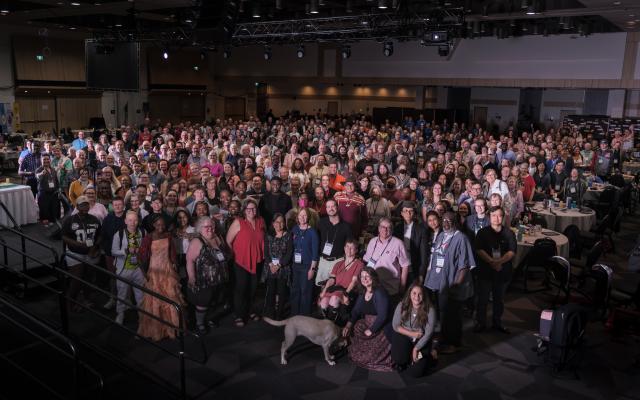For Vicki Nelson, honest conversations on equity at General Council 45 opened minds and hearts to experiences from across the church.

Our church is an extraordinary thing.
This summer, I had the privilege of attending the 45th General Council. Although I wasn’t a voting Commissioner, I read the proposals, took notes in discussion groups, and was present for the entire meeting. The court gathered and witnessed incredible honesty, thoughtfulness, and vulnerability as people took seriously their duty to make decisions for our beloved denomination.
One word that kept popping up from the front of the room, and in many conversations I had over meals and in hallways, was equity.
Every day, Rev. Franklyn James, a member of the Equity Team, discussed equity in engagement and meeting flow, and real efforts were made to ensure everyone could participate fully.
The other place where equity cropped up was in discussions of money.
One proposal before the court was about the assessment rate for communities of faith. Harry Li, the Executive Officer of Finance, explained that the existing assessment rate could no longer support the work of the regions and General Council at its current level. In smaller discussion groups, and then with the full gathered court, there was much discussion about what a rate increase could do to small communities of faith already struggling with rising costs. However, there was also a strong sense that folks don’t want to reduce the capacity of the wider church by not raising the assessment rate.
From the tension between these concerns, discussions about equity arose. The existence of have and have-not regions and communities of faith was laid bare and discussed.
Commissioners and others acknowledged that youth ministry, pastoral support, capacity to support incorporated ministries, and other services are not equitable across the regions. For many, this was eye-opening.
There were vulnerable conversations about individuals’ own pastoral charges and the financial strain or fiscal abundance they knew all too well.
Although no final decisions were made, a beautiful thing happened: people had the chance to dream together about other ways of being church. Being face-to-face with people from all over the country and all over the church helped open eyes and hearts to a diversity of joys and struggles.
There were honest conversations about a more equitable assessment model. Instead of a flat percentage across the board to be paid by communities of faith, and an equal sum shared to each of the 16 regions, people wondered how this system could be transformed so that churches big and small, based in areas with high property values and low, as well as regions with large or small financial reserves, could all become fully part of a church set towards growth and flourishing.
I don’t know where the church will land on that particular proposal, but certainly much has been gained from the conversation—not least, an intention to keep equity, and the desire to build the Kin-dom of God at the center of all the church does.
Many of the voices I heard, from all levels of the church, talked about how our denomination’s success, ministry, and thriving are absolutely linked to the success, ministry, and thriving of the grassroots—of all the congregations who, together, are the church.
Those voices were clear. We are our siblings’ keepers.
—Vicki Nelson is Community of Faith Stewardship Support for Pacific Mountain, Chinook Winds, Northern Spirit, Living Skies, and Prairie to Pine Regions of the United Church of Canada.
The views contained within these blogs are personal and do not necessarily reflect those of The United Church of Canada.